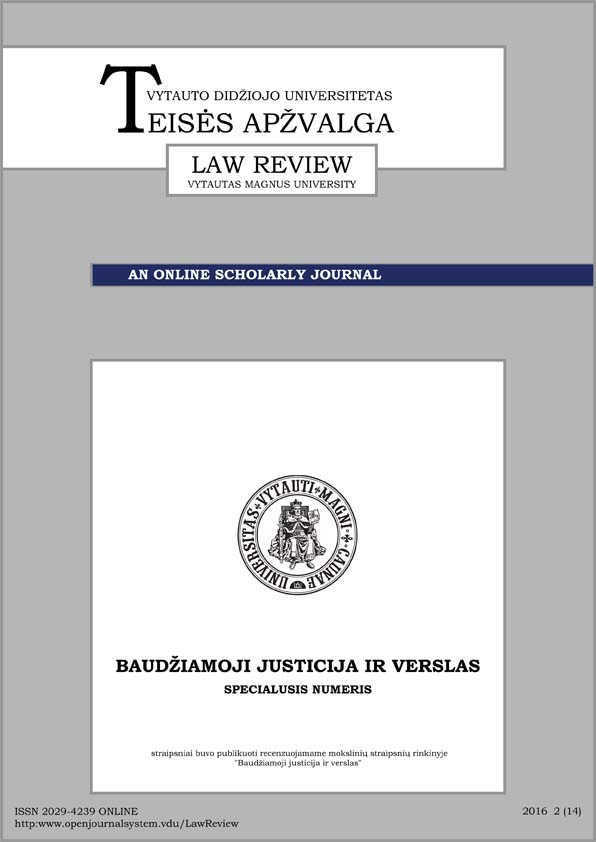Galimybės tobulinti tarptautinio teisinio bendradarbiavimo baudžiamosiose bylose pagrindus Lietuvos teisėje
Possibilities to Improve the Foundation of International Legal Collaboration in Criminal Cases in the Legal System of Lithuania
Author(s): Andrius NeveraSubject(s): Law, Constitution, Jurisprudence, Criminal Law
Published by: Vytauto Didžiojo Universitetas
Keywords: Criminal law; Criminal procedure; International legal cooperation; Extradition
Summary/Abstract: Nusikalstamumo kontrolės taikant tarptautinio teisinio bendradarbiavimo instrumentus ištakos siejamos su IX amžiaus pradžia. Per daugiau nei dviejų šimtų metų laikotarpį pasirašyta daugybė šios srities tarptautinių sutarčių. Daugelis pasaulio valstybių nuolat tobulina praktinius tarptautinio teisinio bendradarbiavimo aspektus, o Europos Sąjungos lygiu įtvirtintos ir sėkmingai veikia nemažai supaprastinto teisinio bendradarbiavimo formų. Tačiau, nepaisant šių pozityvių poslinkių, Lietuvoje šiandien dar galima įžvelgti tam tikrų tarptautinio teisinio bendradarbiavimo baudžiamosiose bylose problemų. Autoriaus nuomone, turėtų būti tobulinamos tiek materialiosios, tiek ir proceso normos, nereikėtų siekti teisiniobendradarbiavimo klausimus spręsti taikant baudžiamosios teisės normas, o tarptautinio teisinio bendradarbiavimo baudžiamosiose bylose pagrindas turėtų būti ne tik tarptautinė sutartis, bet ir specialiojo nacionalinio įstatymo normos.Straipsnyje nagrinėjama tarptautinio teisinio bendradarbiavimo baudžiamosiose bylose reglamentavimo istorija, atitinkama užsienio valstybių bei Lietuvos pozityvi ir negatyvi patirtis, galiojantys nacionalinio teisinio bendradarbiavimo baudžiamosiose bylose pagrindai, brėžiamos jų tobulinimo principų gairės. Taip pat siūloma keletas aktualiausių tarptautiniam teisiniam bendradarbiavimui baudžiamosiose bylose įtaką darančių veiksnių reglamentavimo modelių. The topicality of the issue concerning the international legal cooperation in criminal cases did not fade away until the beginning of the 19th century when on 2nd March 1802 the first multilateral international treaty intended for the extradition question was signed. Nevertheless, the fact that on the basis of this treaty neither person was surrendered actually became a significant signal that the fluency of the legal cooperation in criminal cases of states may be ensured only with the alternative of the international treaty – national law. Despite the fact that in 1994 Lithuania sent a message to the world that the legal cooperation at least in the sphere of extradition shall take place on two legal grounds (international treaty or national law), in the real world the second ground of legal aid in principle was not developed. The reason of such situation is that in Lithuania the regulation of this question regarding the international legal cooperation of states in criminal cases did not have nor has coherent concept. Breaches of legal regulation and discrepancies as well as Lithuania’s practice initiating extradition procedures in the absence of international treaty, in author’s opinion, enable to speak more decidedly about the necessity to build the so called unconventional bridge of legal cooperation in criminal cases with foreign states. Only under this condition Lithuania has a right to speak about concrete and not illusory actions securing efficient crime control based on the principle aut dedere aut iudicare.It is assumed that improving Lithuania’s legal base it would be useful to refine cases when international legal aid in criminal cases is possible only on the basis of international treaty and when on the basis of national law. The question regarding the content of corresponding national legislation is an issue of a wider discussion. Points of view may be diverse. For every form of the international legal aid in criminal cases a separate law (special procedural legislation) may be adopted or one specialised procedural law regulating all issues related to the international legal cooperation may be passed. Moreover, the question of the status of legal aid requests received by foreign states may also be a debatable matter. In this case, author offers to draw attention to the practice of Canada when extradition requests presented not on the grounds of international treaty are regarded as ad hoc contracts.Arguing the need of the national extradition law or the law standardizing questions of other international legal aid forms, the author suggests solving series of important issues among which the most urgent are the following: concept of the political offence, term of the reciprocal criminalisation, humanitarian conditions prohibiting the legal cooperation. Furthermore, in the opinion of the author, resolving the valid problems of states’ international legal cooperation, Lithuania should also improve norms regulating criminal jurisdiction principles as the existing system of these principles does not ensure the inevitability of responsibility.The other author’s position of principle concerns the fact that issues of states’ legal aid in criminal cases should not be regulated by the norms of the Criminal Code as they have no direct connections neither to the purpose of the Criminal Code nor to main regulations of the criminal liability, nor to the validity of the criminal law. Meanwhile, the procedural nature of norms regulating legal grounds and order of states’ international legal aid in criminal cases is evident because concerned norms inter alia help shortly and comprehensively to disclose offences and properly apply the law.
Journal: Teisės apžvalga
- Issue Year: 2016
- Issue No: 2(14)
- Page Range: 396-410
- Page Count: 15
- Language: Lithuanian

